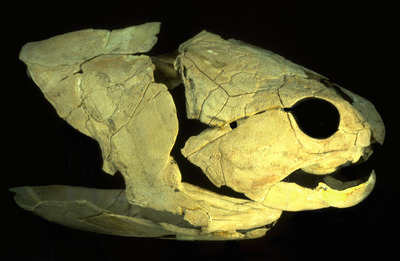Primitive fish fossil nods its head
Preserved muscle tissue on an ancient fish fossil may provide insights into the early evolution of vertebrates, according to a new study involving a collaboration between Australian and European scientists.
The first vertebrates were jawless fishes and included the cyclostomes (lampreys and hagfishes). Development of the varied jaw structures seen in vertebrates today required the reconfiguration of the muscular and skeletal systems of the vertebrate head and neck.

Without fossilised musculature to prove otherwise, researchers have assumed that the earliest jawed vertebrates - an extinct class of armoured fish called placoderms - had a primitive structure, much like that found in sharks.
Now, research by Dr Kate Trinajstic from Curtin University in Perth and colleagues, using the only known example of preserved three-dimensional musculature from a placoderm fossil (a 380-million-year-old Eastmanosteus fossil from the Upper Devonian Gogo Formation of Western Australia), shows something different.
By examining patterns in fossilised placoderm muscle tissue, the researchers found that the muscle architecture was distinct from that of sharks. This included the creation of a separate shoulder girdle with several distinct neck muscles and a notable dermal joint between the skull and shoulder girdle.
In contrast, sharks have a broadly flexible neck lacking these jointed elements.
The researchers also found musculature in the placoderm abdomen that closely resembled abdominal muscle tissue of tetrapods, the first four-limbed vertebrates.
Transverse abdominal muscles were thought to be a tetrapod innovation. However, this discovery suggests it arrived with jawed vertebrate, or at least this group of placoderms.
This research was published online by the journal Science.
Babies of stressed mothers likely to get their teeth earlier
Maternal stress during pregnancy can speed up the timing of teeth eruption, which may be an early...
Customised immune cells used to fight brain cancer
Researchers have developed CAR-T cells — ie, genetically modified immune cells manufactured...
Elevated blood protein levels predict mortality
Proteins that play key roles in the development of diseases such as cancer and inflammation may...





